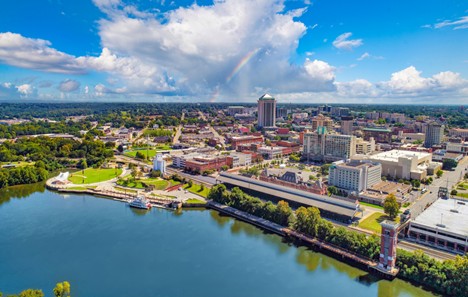
Tennessee’s real estate market in early 2025 shows a change. It is moving from fast growth to a more stable and balanced situation.
The state’s metro areas, especially Nashville, Knoxville, and Memphis, have strong housing demand. This demand comes from population growth, job opportunities, and a low cost of living. However, rising interest rates and increased housing supply have softened the market’s edge, creating more opportunities for buyers.
The Tennessee rental market is finding balance. Cities like Nashville are still seeing rental growth. Other areas in the state are seeing rents stabilize. This trend aligns with broader real estate market conditions across the U.S., where affordability and supply-side dynamics are reshaping buyer and renter behavior.
Residential Real Estate Trends – January 2025 Snapshot
| Metric | Tennessee (Jan 2025) |
| Median Home Price | ~$383,700 (↑5.3% YoY) |
| Home Sales Volume | ↑3.5% YoY (homes sold vs. prior year) |
| Median Days on Market | ~75 days (up 7 days YoY) |
| Inventory for Sale | ↑16.8% YoY (more homes on market) |
| Average Rent | ~$1,600 (↓$196 YoY, –11% YoY) |
Residential Market: Moderation with Opportunity
The Tennessee housing market in 2025 presents a compelling case of moderated yet healthy growth. The median sale price is about $383,700. It has increased by 5.3% over the past year.
This makes the state attractive for affordable housing compared to the national average. These price increases reflect continued demand for housing, especially in job-rich metro areas.
Single-family homes are still the most popular type of property. However, housing supply has risen by nearly 17% compared to last year.
The median days on the market is now 75 days. This shows that the market is becoming more competitive. This shift benefits buyers, who now have more negotiating power and access to a wider range of listings. Sellers are adjusting expectations—roughly 23.8% of listings saw price reductions recently.
Market conditions show a slowdown from the pandemic rush. Inventory is returning to healthier levels.
Demand is increasing, which balances with rising supply. This is clear in East Tennessee cities like Chattanooga and Knoxville. Well-located properties still draw strong interest there.
Experts predict that the real estate market will grow by 4–6% in 2025. Ongoing migration, lifestyle appeal, and smart development in growing communities will drive this growth.
Rental Market: Cooling Statewide, Strong in Core Cities
The Tennessee rental market 2025 tells a nuanced story. In urban hubs like Nashville, average rents continue to rise modestly, with 2.9% YoY growth reported in Q1. The typical rent for a one-bedroom is now ~$1,745 and ~$2,215 for a two-bedroom.
This is because many people want to buy homes. There are few available houses. Many professionals are waiting to buy homes. They are holding off because of high prices and interest rates.
Statewide, however, average rents have declined 11% YoY to approximately $1,600. This trend shows the overall housing market. A lot of new apartment buildings have created more affordable housing in places like Knoxville and Murfreesboro. Landlords outside of core metro areas are now offering incentives such as reduced deposits or free rent periods.
Vacancy rates are creeping up in less densely populated areas, and renters are gaining more choice. Though the cost of living in Tennessee remains below the national average, renters are increasingly weighing their options. Analysts expect rental growth to remain flat to slightly positive in 2025, depending on location.
Investor Insights: Smarter Moves in a Softer Market
Tennessee remains a focal point for real estate investing, especially among those seeking value in high-growth regions. However, investor strategies are shifting. With interest rates higher and market conditions less aggressive than in recent years, investors are becoming more discerning.
Tennessee real estate investors in 2025 prefer smaller single–family homes in high-yield neighborhoods. They also like duplexes in growing suburbs and mixed-use developments in revitalized downtown areas. Nashville, East Tennessee, and Middle Tennessee attract a blend of institutional and independent investors.
NAR highlights emerging markets like Knoxville as some of the fastest-growing housing areas. This growth is due to economic expansion, affordability, and livability. Meanwhile, Memphis continues to draw investors interested in real estate investing for rental yield and long-term appreciation.
The trend for 2025 is clear: investors are adapting. They are looking at market conditions. They want metro areas with job growth, stable rent returns, and properties priced below the median sale price.
Investor Focus: Strategic Markets and Negotiation Power Emerging in Tennessee
High-rent yield areas like Antioch, Knoxville suburbs, and parts of Middle Tennessee are becoming increasingly attractive to real estate investors in 2025. The Tennessee housing market has shifted, creating better opportunities for negotiation and long-term value acquisition.
This is especially true in growing tech and logistics corridors such as Chattanooga and Murfreesboro, where prices have recently stabilized, and buyers now face less competition. Investors are gradually returning, focusing on steady income-producing assets rather than fast appreciation.
Multifamily properties in job-rich areas and entry-level single-family homes in up-and-coming suburbs are in high demand. Investor strategies are becoming more calculated, targeting stable rent yields, markets with rising populations, and value-add potential rather than speculative flips.
📍 Expanded City-Specific Market Trends – Spring 2025
| City | Median Home Price | Avg. Rent | Key Insight |
| Nashville | $433,467 (↑1.8%) | ~$1,862 | Inventory up 16.5%; homes sell in 25 days. |
| Memphis | $250,000 (↑7.7%) | ~$1,600 | Investor-friendly; prices rising steadily. |
| Knoxville | $350,000 (↑13.4%) | ~$1,750 | Strong demand; homes sell in ~44 days. |
| Chattanooga | $375,000 (↑2.5%) | ~$1,700 | Balanced market; moderate price growth. |
| Murfreesboro | $430,519 (↑3.2%) | ~$1,850 | Suburban growth, tight rental inventory. |
| Clarksville | $300,000 (↑4.0%) | ~$1,600 | Military demand, steady rental market. |
| Franklin | $650,000 (↑5.5%) | ~$2,200 | High-end market; strong buyer interest. |




